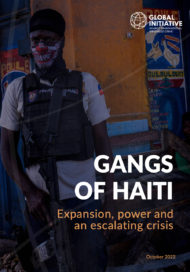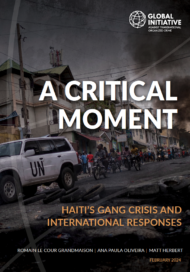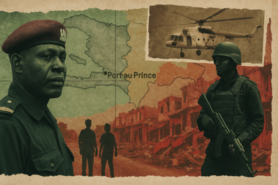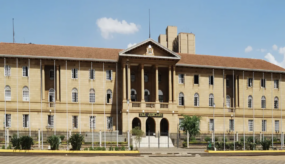Posted on 18 Jun 2024
While gang violence rages in Port-au-Prince, the Multinational Security Support (MSS) Mission designed to tackle the crisis is yet to arrive in Haiti. Announced that it would be deployed in February 2024, then continually postponed, the MSS mission gained momentum in April. US military forces, supported by civilian contractors deployed on site, provided materials for the construction of the operations base, adjacent to the airport. This convinced the Kenyan president, William Ruto, to announce on 23 May the deployment of a contingent of Kenyan police officers during his official visit to Washington to support the mission.
However, Kenyan experts, who had earlier arrived in Port-au-Prince to assess conditions, announced that the base was not ready to receive the Kenyan force. Following this setback, President Ruto, while facing a third legal challenge in Nairobi to interdict the deployment of the Kenyan police contingent, said on 25 May that the MSS would be delayed by around three weeks. That deadline has been and gone, and no further details have been provided, nor on the court’s decision, due on 12 June.
After several months of delays, the MSS, led by the United States and coordinated with Kenya and a handful of Haitian officials, is facing logistical, legal and institutional challenges. However, what is arguably even more concerning is the lack of transparency and clarity that has come to characterize the mission, and the absence of a dialogue between the key actors, the Haitian authorities, civil society and the international community. This fog that has shrouded the mission could jeopardize the operations, including how support is provided to the Haitian National Police.
These challenges stem in part from a general shift in the way the UN responds to crises. With the move away from large-scale UN peacekeeping operations of the past, the international community has been looking for a new framework for security missions. The new thinking partly stems from criticism levelled at UN peacekeeping operations in recent years, and while this change in doctrine brings the opportunity for fresh thinking, there are inherent challenges.
The MSS mission, while approved by the Security Council in October 2023, was conceptualized to be designed and financed outside the auspices of the UN. It therefore does not benefit, for example, from the infrastructure, funding mechanisms, logistics or communications support that the UN would normally provide in a traditional peacekeeping operation. As the mission falls outside of a centrally coordinated and financed UN framework, many have been left questioning who is in charge.
While the MSS mission is governed by Chapter 7 of the UN Charter, it is intended to be financed by a trust fund to which interested countries contribute. As of 10 June 2024, the fund had received just US$21 million from the United States, Canada and France – a far cry from the estimated US$600 million cost of the operation, which is scheduled to last one year. As of now, alongside this trust fund, it is mainly President Biden’s administration that is coordinating and financing the deployment.
The MSS mission has a complex mandate, as analyzed in our February 2024 report, and this situation has raised several objections. At the US foreign relations committees, Republican representatives have been blocking the funding requested by the government for several months, demanding more details on the logistics, duration and objectives of the mission. To date, these reservations have gone unanswered.
Their concerns about the mission’s rules of engagement and timetable are shared by Haitian and foreign observers. A press release from the United Nations Integrated Office in Haiti indicated that the MSS concept of operations (CONOPS) and rules of engagement have been finalized, but these documents do not appear to have been shared outside a restricted circle of Kenyan, American, UN and Haitian officials. Some say the documents must remain confidential because of the risk of information being leaked to Haitian gangs. Nevertheless, communications, public or otherwise, regarding the strategic planning, political agenda and human rights oversight for the mission are conspicuous for their absence.
No authority has yet answered essential questions about the mission’s guarantees of supervision in terms of human rights, let alone how it will be coordinated with the Haitian police, the Presidential Transitional Council, the Haitian National Security Council and the government of the recently appointed Prime Minister, Garry Conille. Given that countries have expressed a willingness to take part in the deployment or cooperate through funding or technical support, this closed door mentality is not conducive to gaining the broad commitment needed from the international community.
The US government says the leadership for coordinating the mission lies with the Kenyan authorities; Kenya meanwhile has avoided communicating a precise plan. The absence of a leading interlocutor or spokesperson for the mission, whether American, Kenyan or Haitian, reinforces the impression of opacity that has descended over the operation.
The situation also presents challenges for the UN, including the Security Council. Resolution 2699, authorizing the mission, stipulates that the Council must receive, prior to the full deployment of the mission, the CONOPS and rules of engagement. Meanwhile, the deployment authorization for the mission is due to be submitted for review at the Security Council from 2 July for a three-month period leading to its possible renewal. Given that no police officers have yet set foot in Port-au-Prince, it is difficult to understand what the review will be based on – but there is the possibility that the mission’s mandate will not be renewed, or that its funding will be impossible to secure over the long term.
The MSS mission will be a crucial test for the international community and the Haitian authorities. It is essential that the various tools – multilateral sanctions, humanitarian aid, human rights monitoring, political support for Haitian public institutions, and social and economic development plans – are designed for the evolving dynamics of violence, and that they are strategically coordinated. Finally, beyond the MSS, it is crucial to make collective progress on resolving the crisis, both in terms of humanitarian access and development, the reconsolidation of public institutions and the judicial solution brought to the gangs and their members.
No one can predict how the gangs will react to the MSS mission. It is safe to assume that some criminal groups will confront the foreign forces directly, while others will prefer to keep a low profile that will enable them to maintain a foothold. In Port-au-Prince, despite a return to calm in some neighbourhoods, the population and the police remain under the constant threat of gang violence. On 9 June, for example, an attack claimed by powerful gang boss Jimmy Chérizier resulted in the death of three anti-gang unit officers. This incident shows how the gangs in Haiti are seeking to exert pressure on the police force and the Haitian government. Will they be able to do the same with the MSS mission, when, or if, it arrives?



